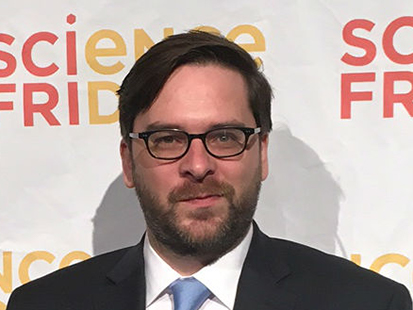RJI Fellowship to develop shareable resources to combat misinformation about science

Missouri School of Journalism students are working with a New York-based radio show to reduce the misinformation about science on social media and the web.
“Science Friday,” a public radio show, hopes to equip its listeners with socially shareable resources with “just the facts” from scientists, says Christian Skotte, head of digital.
This project started after Daniel Peterschmidt, a digital producer, wrote an article about climate change with tweetable tips for sharing scientific information with climate-change deniers. The article went over so well, listeners asked for more resources like it, says Skotte.
But without the staffing to produce enough of these resources on their own, “Science Friday” staff turned to the Donald W. Reynolds Journalism Institute. A fellowship provides them access to students and their capstone professor at the Journalism School. In addition, the partnership provides students hands-on experience as they prepare to enter the job market.
The students have been tasked with taking information from existing “Science Friday” podcasts and transcripts and turning it into dozens of shareable resources that could include social video clips, audiograms and infographics.
Skotte says they anticipate some non-listeners will still be skeptical of the information, but he says he believes that the added credibility of a friend or family member sharing the resources will help.
“There have been studies that show that on social media, a personal friend or a family member is much more likely to change someone’s mind than a news organization,” he says.
Thirty-nine percent of survey respondents of the Media Insight Project reported that they would share an article if a “trusted sharer” originally shared the post, even from an unknown source.
“The key about all of these is they should be immediately easy for someone to understand the facts instead of requiring people to read a long article with citations,” says Skotte. “They’ll be easily understood, very shareable, thoroughly fact-checked and represent scientific consensus.”
Senior Katelyn Brown, a member of the three-person student team, wants to work in an engagement position and says she knows the skills she’s developing will help in her future positions.
“This has given me the opportunity to both practice producing things that are specifically tailored for social but also figure out how to reach the audience they’re trying to reach, which is the most important part of the engagement editor’s job,” she says.
“Science Friday” and the student team are focusing on issues of genetically modified organisms, vaccines and climate change to begin with. When completed the resources will be published and shared on social media.
This spring, Skotte and his team plan to measure the effectiveness of the resources.
“If they work we want to figure out why they work and what makes the resources effective,” he says.
In addition to studying traditional metrics such as views and reach, Skotte’s team plans to interview listeners to glean feedback about how family members or friends reacted to the information and whether or not they changed their mind or reconsidered an issue.
If the experiment performs well, Skotte hopes to share the resources with other news outlets or create templates, so others can create similar projects.
Comments